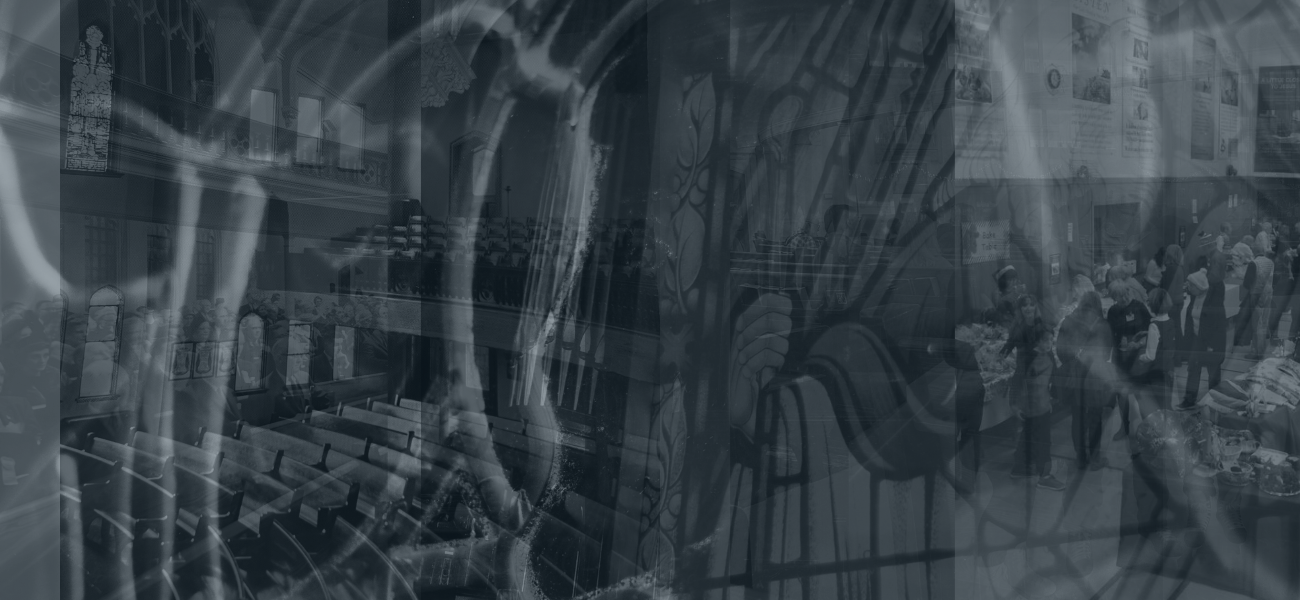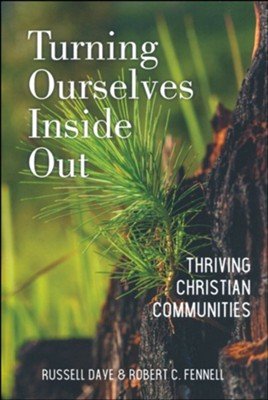
TURNING
OURSELVES
INSIDE OUT
A Series based on the book
Turning Ourselves Inside Out
by Russell Daye and Robert C. Fennell
It is said that St. Andrew’s is not what it used to be. People are concerned about our decline.
Some are losing hope.
However, there is hope – great hope.
Numerous churches across the land are not only surviving but thriving. This sermon series will begin and end with hope.
In between we will explore things like humility, spiritual growth, the vulnerability of love, the importance of knowing who we are and what we are doing and the virtue of courage. And throughout we will have a little bit of fun with the old saying ‘We’ve never done it that way before’, which the authors say is the last seven words of a dying church. We will explore what it means to turn ourselves inside out to see where God is at work in the world.
We pray this series will prepare us for the months and years ahead strengthening our bond as a congregation and inviting us into a future that abounds with grace and hope and love.
The Series
If any statement is true, it's this one: If you don't do what you say you're going to do, everything falls apart. The challenge with Integrity is always to follow through, even when it's hard or we don't feel like it. In this episode, Rev. Marty and Mike discuss how if Hope, Humility and Love are the foundations to build your faith and a church, Integrity holds it all together. We hope this episode inspires you to jump into what St. Andrew's has next with both feet and helps us be a church that practices what it preaches.
If any statement is true, it's this one: If you don't do what you say you're going to do, everything falls apart. The challenge with Integrity is always to follow through, even when it's hard or we don't feel like it. In this episode, Rev. Marty and Mike discuss how if Hope, Humility and Love are the foundations to build your faith and a church, Integrity holds it all together. We hope this episode inspires you to jump into what St. Andrew's has next with both feet and helps us be a church that practices what it preaches.
Integrity for our purposes is defined as knowing who we are and being who we are. Who are we at St. Andrew’s. What are we up to? What is God doing in our midst? Do we all know the direction we are heading? We talk about ‘Encountering God in worship, Engaging Jesus in the Streets – Building an Outpost in the Kindom of God. It comes out of the study done by the congregation over the last 5 – 6 years. But does anyone really know what that means? How do we communicate it more effectively? What is a tagline and how might we use one here at St. Andrew’s.
A hard look at love. Love is not just emotions. It is hard decisions we make. It is how we look at ourselves and how we look at others. It is deciding what to love and who to love. What do we love about St. Andrew’s? Who do we love in the community? Are there things we need to let go of in order to truly love?
A hard look at love. Love is not just emotions. It is hard decisions we make. It is how we look at ourselves and how we look at others. It is deciding what to love and who to love. What do we love about St. Andrew’s? Who do we love in the community? Are there things we need to let go of in order to truly love?
Residential schools were designed to make children ashamed of who they were in terms of their culture, spirituality and identity. There is no denying this. Christians at the time were convinced that they knew better, that they needed to ‘bring God’ to the ‘savages’. It was a dark time in the history of Canada. The effects of residential schools and colonization are still felt today. Healing and reconciliation in part is understanding that First Peoples here on Turtle Island can teach us about God. Traditional spiritual practices that so many are trying to reclaim can teach us a Christians what it means to truly be a spiritual person in terms of our connection to the created world and to each other. As Christians we don’t have all the answers. God was here long before the settlers arrived.
When we think there is nothing left to learn, that we have heard it all before, our hearts are closed and we no longer are able to see what God is doing in the world. Opening our hearts enables us to discover the joy of seeing God at work today.
This podcast will be a brief history beginning in the Dark Ages to the Enlightenment, to Modernity and then Post Modernity – all from the perspective of the question ‘Where is God and what is God doing?’ We will end with the strong affirmation of the belief that God is an active agent in the world today. We expect to be surprised each day by what God is up to.
Quotes to Reflect On
-
Emotional ease and openness of heart reflect an underlying virtue of hope that characterizes this community of faith
Turning Ourselves Inside Out, pg. 27
-
There is a critical nexus where three things meet: the church, the world and God’s mission
Turning Ourselves Inside Out, pg. 31
-
The challenge is seeing God at work in the world around us instead of trying to make the world look more like us
Turning Ourselves Inside Out, pg. 30
-
noticing the movement of God in the world is an art that local communities of faith can become experts in
Turning Ourselves Inside Out, pg. 46
-
The church exists to enable normal everyday people to walk the way of Jesus
Turning Ourselves Inside Out, pg. 47
-
What God does in us is as important as what God does through us
Turning Ourselves Inside Out, pg. 49
-
The key question for mainline churches is not ‘how shall we die?’ but rather ‘how shall we join in on what God is doing today and live?’ – the way to move from one to the other is to adopt a stance of humility and become a community of learning and spiritual growth
Turning Ourselves Inside Out, pg. 55
-
In the liberal church, there has been a drift from understanding God as someone we encounter to someone we think about. We spend more time trying to ‘define God’ and less time listening to the whispers of God.
Turning Ourselves Inside Out, pg. 64
-
The future God calls us to is ‘already alive – at least in potentiality – and it invites us into a way of living in resonance and alignment with God’s love. This more down at its most powerful is an entry into the heart of God. Here any impetus to power is changed to an impetus to love, even if that love requires self-sacrifice. Here we move from ‘might is right’ to love is right
Turning Ourselves Inside Out, pg. 67
-
most of the thriving Christian communities we met have a strong sense of identity. They know who they are, why they are, and where they are going’ ‘They have a shared purpose and they are linked together through that purpose’ ‘they are a people of God, followers of Jesus, sharing a community that is committed to seeking and living out God’s intentions for the world.
Turning Ourselves Inside Out, pg. 93
-
Conversations in thriving churches shift from ‘how do we fix the church?’ to ‘what is God up to? That outward orientation – what we name in this book as turning ourselves inside out – helps us move our unproductive attention away from our own struggles and problems so that we can notice and follow where God is at work in our world
Turning Ourselves Inside Out, pg. 99
-
Cohesiveness within thriving faith communities is also revealed in a congregation’s shared sense of integrity. That is, they are able to say ‘this is who we are, and we know that to be true about us, so this is why we do what we do
Turning Ourselves Inside Out, pg. 101
-
willingness to risk is essential for thriving and vitality. It’s the secret sauce of churches that are breaking out of the paradigm of decline and punching above their weight in terms of impact on the world around them
Turning Ourselves Inside Out, pg. 79








To step out in faith, taking risks and being part of God’s mission in the world as the church is re-invented takes courage. We will look at Paul’s teachings with respect to Abraham and remember Jesus words that we are to always be alert to what God is doing in the world. This sermon will hopefully help us to prepare for the new future God has in store for us as we travel through Advent, Christmas and beyond. St. Andrew’s is poised and ready.